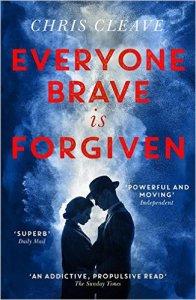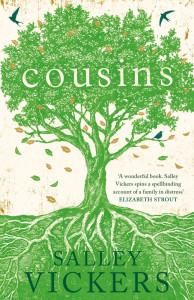One of the many wonderful things about books is that they give us a safe space in which to encounter difficult and frightening thoughts. The structure of a book, with its perceptive narrative voice and its promise of an ending, guarantees us at least one of the four great anti-anxieties: meaning, wisdom, truth and resolution. Whatever darkness the story brings, these four are the light.
How much darkness we can take, how much light we need is, I think, a very personal ratio. When I was younger, I had a lot more capacity for difficult and demanding novels. I had more stamina for reading about suffering. These days I can endure a great deal less. I’m sure this is in part because I am increasingly interested in what it means to be compassionate in the world. I’ve been reading a book lately that defines compassion as a two-part process. The first part is to look squarely at the pain, but the second, and equally important, is to think how suffering can be eased. This is not to say that bad events and the pain that accompanies them can be avoided. Alas, no. But what it does mean is that whatever pain we – or others – endure, the important part is to seek to minimize the extra and sometimes unnecessary suffering that clusters around it. The news, for instance, only thrusts the pain of the world in front of us – it has nothing to say about what can be done about it – and so it is essentially unkind. But literature is quite different. A well-told story is constantly helping the reader to stay clear-sighted and engaged while conflict takes place, so that we can think about it without being overwhelmed.

Mary is set to work as a teacher – not at all the sort of adventure she was longing for – and finds it surprisingly fulfilling. In particular, she forms a bond with Zachary, a dyslexic child (though no one understands this in 1939) whose father works in the Black-and-White Minstrels show in the West End. When Zachary returns from the country, having learned that rural prejudice is more dangerous than German bombing, Mary ends up in charge of a class of rejects. Children with learning difficulties or behavioural difficulties for whom the beauty pageant of evacuation has been a disaster. She also begins a love affair with Tom, who cannot help but admire her daring, courageous intentions, even while deploring the trouble she causes by them. People tend to have this mixed reaction to Mary – her well-born, well-bred mother, and her best friend, Hilda, being other examples. There is a long-held tradition of Mary pinching Hilda’s men, and so when the friends go for a double date during Alastair’s leave, the tradition raises its head in especially dangerous ways.
So far, I’ve made this book sound quite appealing, I hope, and mostly about love and friendship. But the majority of the narrative is concerned with the experiences of these characters during the Blitz and – in Alastair’s case – in Malta during its lengthy siege. And oh my lord, Cleave does not hold back with the horror of wartime. In fact, it is fair to say that the characters now undergo a series of traumas that will leave them broken and spent. I found long sections of this book very hard to listen to, and quite often I put my fingers in my ears and sang la la la la a lot. I only listened to a certain amount of it each night, so as to get to sleep. And then, when the horror never abated but seemed to be piled on and on, relentlessly, I found myself starting to laugh because I just couldn’t stay in that engaged place. Sometimes more is just too much.
Why did I stick with it? Well, essentially because of the quality of Chris Cleave’s prose. Here I owe the man an apology, because I seem to have contracted a prejudice about him. I thought he wrote just sensational stuff, all about making an audacious impact. And whilst this is sort of true, he can really, really write. He also keeps the characters’ interactions light. I’m not sure that everyone in wartime was this witty, but it’s nice to think so. There’s a real British spirit operating here (Brits really do whine during good times and then discover a sense of humor in awful crises), with the characters quipping away at one another, refusing to show they are rattled by deadpan humor. When a group of men are clinging to a too-small life raft off the coast of Gibraltar, the talk is all of the fish and chips they’ll have when they reach Brighton. The dialog is very good, sharp and smart and pithy. Does it make up for all the characters go through? No, not really. It’s a bit like glitzy nail varnish on a corpse. But the ending is very gently hopeful, and the story is apparently based on the experiences of Cleave’s grandparents during the war (this bit was missed out of the audio book – shame!) and so you do believe there was the possibility of a happy ending eventually.

This novel begins with teenage Hetta being woken in the night by her parents. They have just received a phone call that changes everything: Hetta’s older brother, Wil, was climbing the tower of King’s College Chapel in Cambridge, where he is a student, when he fell. The family make a stricken dash through the night from Northumberland to Cambridge, fearing that Wil may die before they arrive. In fact, what happens to him is worse than that.
What happens after this is essentially the slow, gradual retelling of a long family saga. We have to understand Wil’s fall as the culmination of all sorts of family tensions and secrets which Hetta is determined to uncover. In the immediate present, the fall seems to be linked to a forbidden relationship between Wil and his cousin, Cele, a young woman who has been much neglected by her mother, and who has sought refuge while growing up in Hetta’s family. Brought up almost as brother and sister, Wil and Cele have been a great deal more to one another than that. And this turns out to be a repetition of an earlier family root. Hetta’s grandparents were also first cousins, but they managed to marry – though not without an indiscretion of Hetta’s grandfather producing a child, Nat. Nat’s mother is killed during the Blitz, and so Hetta’s grandmother brings him up as if he were her own. In fact, she feels closer to Nat, more loving of him than she does of her other children – Belle, Cele’s selfish mother, and Beetle, Hetta’s timid and sensitive father. Then tragedy strikes Nat, and a long string of family consequences ensue.
This is a novel of two parts. The majority of the narrative is concerned with retelling family history, and it switches between the hands of Hetta, her grandmother, and Belle. But the latter stages are quite different, a courtroom drama of sorts, and I found the change of pace and direction a little disorientating. However, there is much emotional resonance in these events, as it feels as if the unpunished, unseen ‘crimes’ of family life finally reach a sort of fruition in an actual court of law. And what happens here, how the crisis is dealt with by the family, is an outright attempt to make amends for all that has gone before.
Cousins is not a smooth book. The start is rather slow, the end is rather surprising, but I enjoyed it very much. Salley Vickers has a gentle hand with tragedy, allowing the narrative to touch it and then move away. Funnily enough, this was the book that brought me to tears on a couple of occasions, which goes to show that you do not have to put the reader’s heart through the wringer to be assured of creating an effect. In fact, I often think it is kindness and simplicity that are really tear-inducing. And maybe that’s because we weep when we encounter compassion, since we are so sorely in need of it.
Advertisements